Major Project
“A systems approach to Fatbergs” - Developing system-level interventions from the… [Read more]
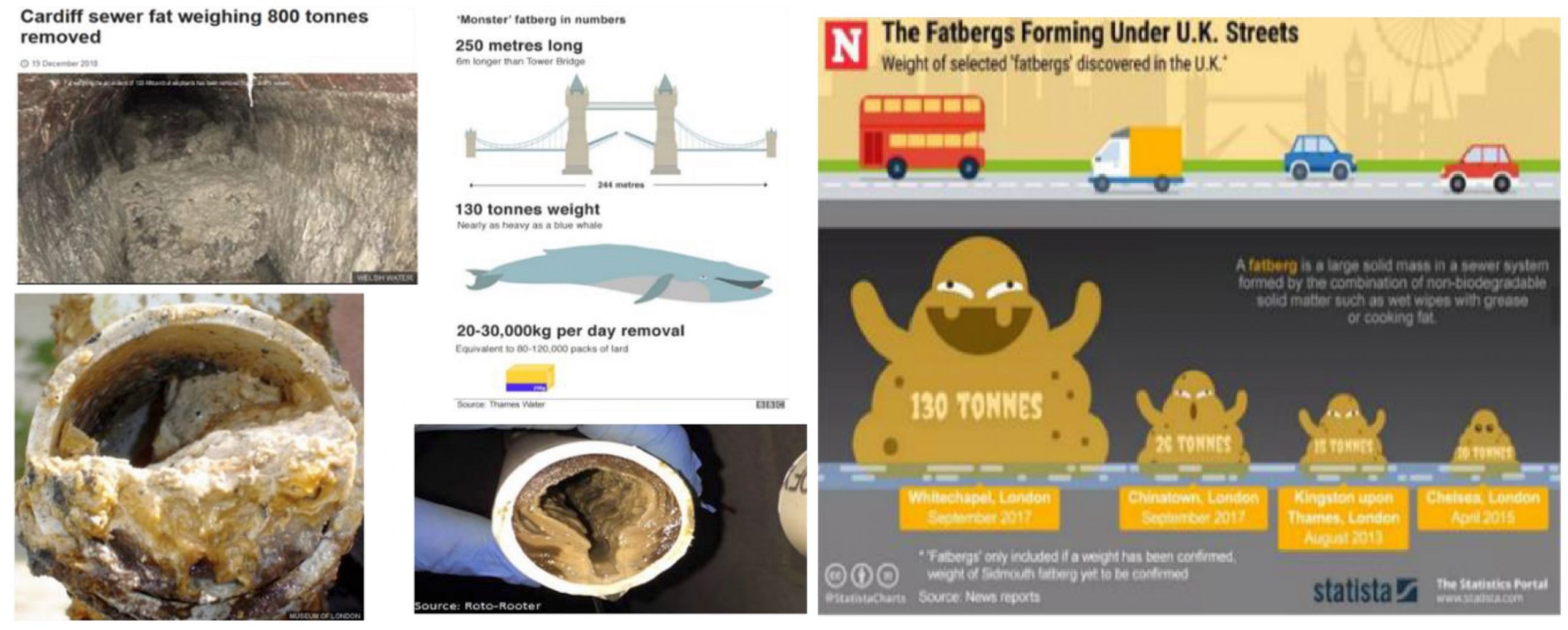
"Problem" - The Fatberg - As it was exposed to domestic cooking oil users. (sources: text in image)
"Problem" - Increasing "Situation Awareness" for the problem. This image was a part of a shared screen presented by the end of the interview to all research participants sampled in this study that expressed motivated to know more about of this concern, of which, they are stakeholders. (sources: text in image)
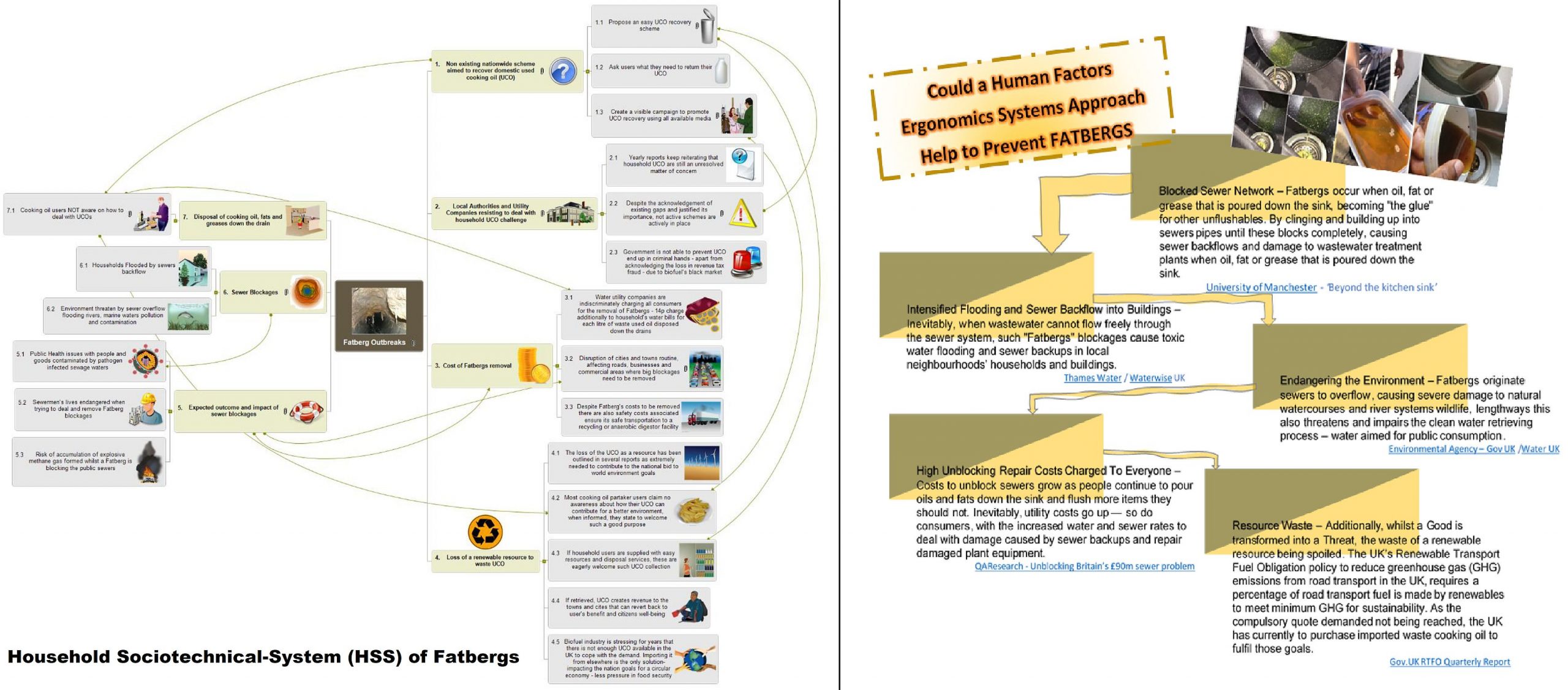
"Aims"- Could Human Factors Ergonomics Help to Prevent the Fatberg Problem?
"Aims"- To investigate this socio-technical system employing a behaviour change approach, to find out underlying reasonings and motivations concerning domestic household disposal of cooking oils.
Findings could foster interventions to prevent the disruption of the sewer network caused by Fatberg outbreak blockages.
Could Human Factors Ergonomics Help to Prevent the Fatberg Problem?
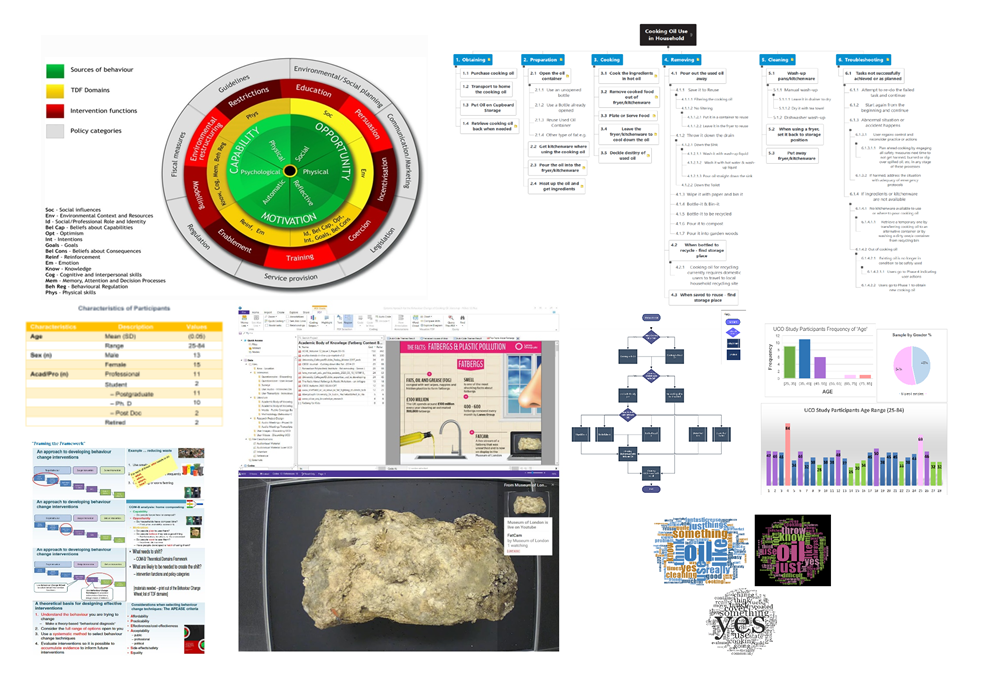
“Methods” - The research applied in this sociotechnical system used Behaviour Change Theories (BCT's) i.e. Behaviour Change Wheel (BCW) with Theoretical Domains Framework (TDF)
“Methods” - The Research Method used for this sociotechnical system made use of Behaviour Change Theories – Behaviour Change Wheel with Theoretical Domains Framework
• Choice of methodology and methods – Qualitative Analysis
• Sampling strategy – Convenience sampling (snowballing admitted)
• Data collection – Observation with Survey with Semi-Structured Interview
• Data Analysis and Reduction – Constant Comparative Method with NVivo Thematic Analysis Software
• Data display – Tables and Word Clouds
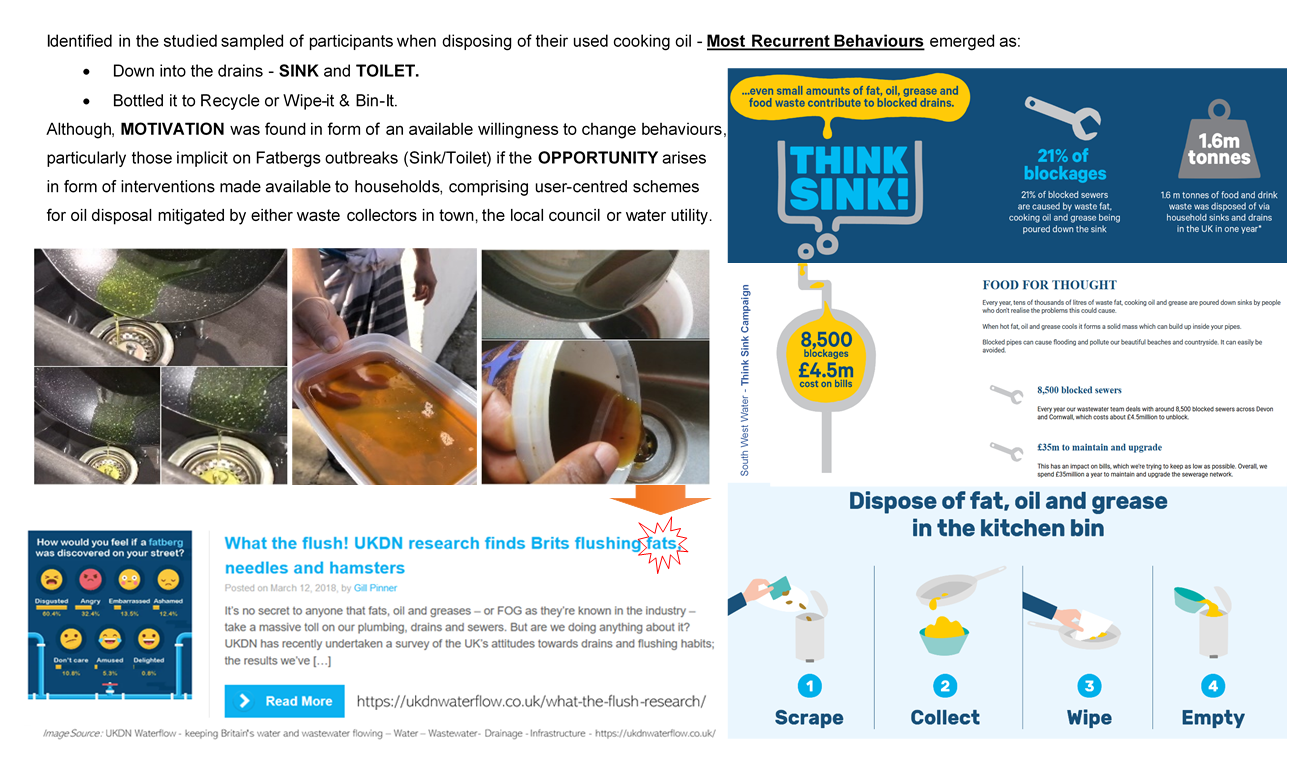
"Findings I" - These suggest that household cooking oil users are short of suitable options provided by waste-collectors
"Findings II" - These suggest that household cooking oil users are short of suitable options provided by waste-collectors. Identified in the studied sample of participants when disposing of their used cooking oil - Most Recurrent Behaviours emerged as:
• Down into the drains - SINK and TOILET.
• Bottled it to Recycle or Wipe-it & Bin-It.
Although, MOTIVATION was found in form of an available willingness to change behaviours, particularly those implicit on Fatbergs outbreaks (Sink/Toilet) if the OPPORTUNITY arises in form of interventions made available to households, comprising user-centred schemes for oil disposal mitigated by either waste collectors in town, the local council or water utility.
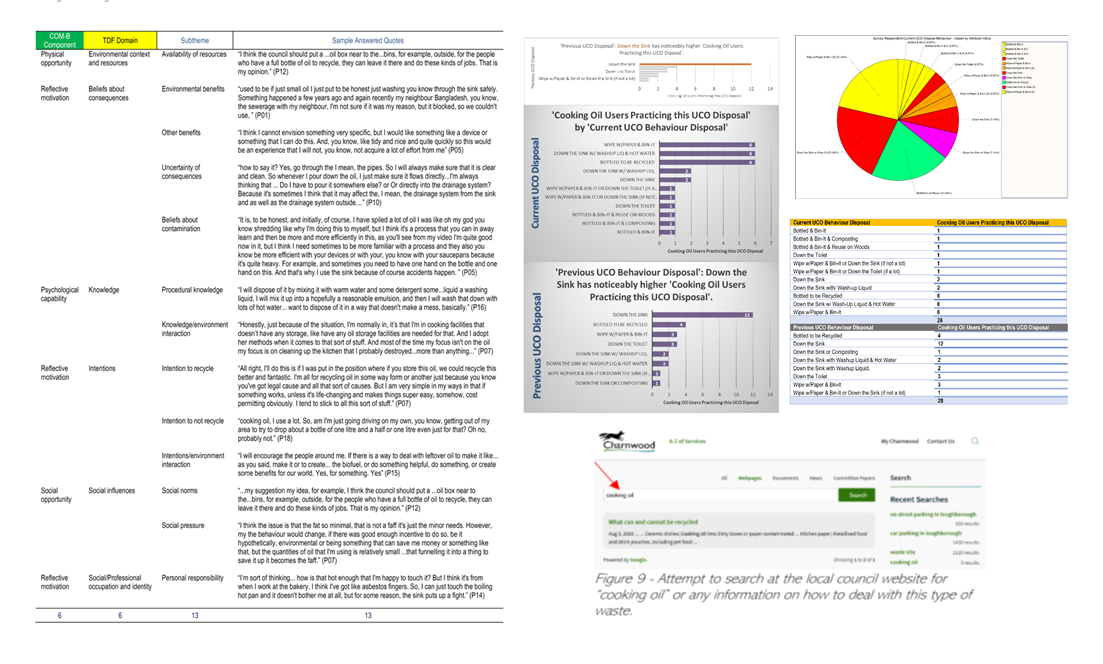
"Findings III" - The findings suggested that household cooking oil users feel let down by the lack of suitable oil disposal options. Meanwhile, with exceptions, Out-of-sight then Out-of-mind feelings prevail.
The findings outlined from coded the transcripts using the COM-B model (Michie, Atkins et al.,2014; Michie, van Stralen et al.,2011) and the TDF (Cane et al.,2012) have constructed the themes identified. Then, the emerging results generated with the application of the COM-B and TDF framework suggested that, in general, cooking oil users from households from this Charnwood area. Yet, it may include the remaining widespread to all over the UK, are still short of appropriate options provided by waste-collectors and to deal with this form of waste. 13 TDF elements were identified emerging from initial COM-B components, with a few exceptions, the feeling of out-of-sight-out-of-mind prevails and waiting for appropriate interventions that could retrieve used cooking oils out of users hands and prevent the Fatberg outbreaks.
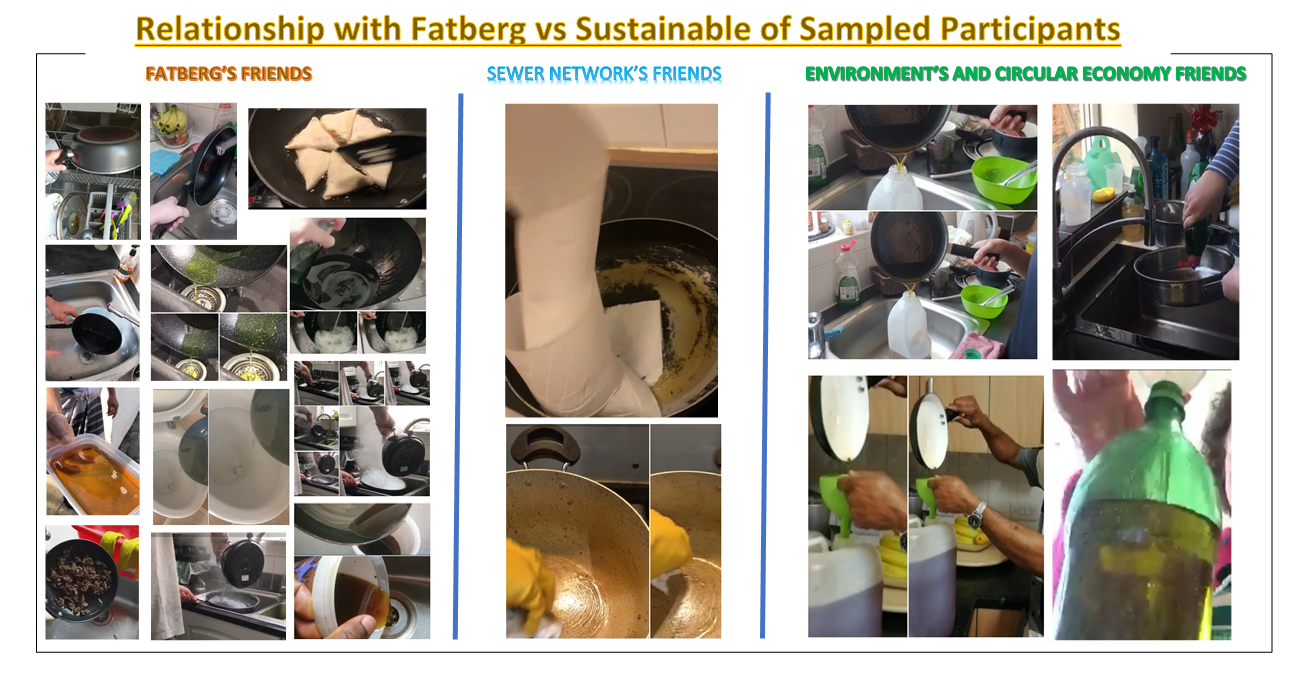
"Findings IV" - Relationships - In which category household's sampled participants were found?
"Findings" - Relationships - In which category household's sampled participants cooking oil users neutralize?
A collage of a few stills pictures retrieved from video demonstrations of participants disposing of their cooking oils after finishing cooking. Genuinely, those framed here, categorised as Fatberg friends, did not reveal any malice intentional in disposing of the oil down the drain this way, for contempt or negligence. But this could be identified as an easy and gullible way to do it, regardless of other additional considerations of doing it using plenty washing up liquid and hot water will be sufficient to neutralise the congealing propriety of oils and fat after disposed of this way.
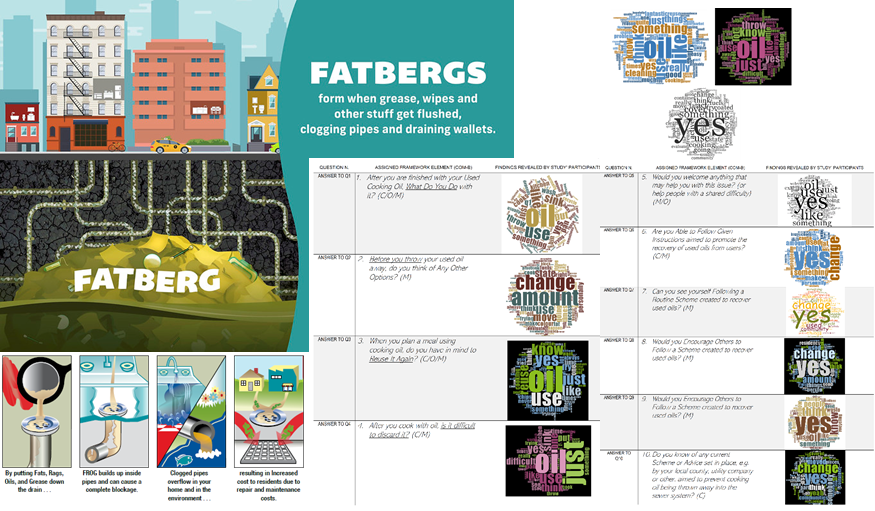
"Findings V" - Results revealed by the sample of participants
The word cloud answers with the findings illustrating participants reasonings. The first set reports how and what they do. However, the second set of questions reveal an existing MOTIVATION willingness to change behaviours, depicted as “YES” if the OPPORTUNITY of a well-implemented intervention rises, combining household users considerations and needs in mind, as reported by households sample in this study.
The NVivo consolidated table assorts the whole questionnaire answers of the interview schedule and for a seemly visually presentation. This outline encompasses the qualitative data analysis provided by the behaviour change frameworks used, .i.e. BCW with COM-B and TDF.

"Conclusion/ Discussion" - Results suggested that household cooking oil users are still short of suitable options provided by waste-collectors.
The outcome of discussing findings and results emerged by the application of the COM-B and TDF framework suggested that, in general, cooking oil users from households, in this case, from this Charnwood area, although also widespread to all over the UK, are yet short of suitable options provided by waste-collectors to deal with this form of waste.
Scattered enablement of pilot trials emerging, e.g., Sainsbury's/Olleaco/Scottish Water at an Edinburgh's, a supermarket car park cooking oil collection, are not part of an effective national campaign to stop Used Cooking Oil (UCO) disposals down into the drains. Therefore, it will be challenging to see replications or even find established reasoning out of such subjective small-scale regional experiment.
Legal cause through coercion is almost unfeasible, due to the household's privacy issues. Other leading research Team of Social and Human Scientists experts mainly based in Manchester/Sheffield/Keele funded by the ESRC, stressed the same concerns at the "NEXUS at Home" WEF Project. There is need for more research addressing this problem by applying practice theory to inform better interventions aimed at changing behaviours regarding this context of the "Water, Energy and Food" (WEF) NEXUS in the home.
Nuno Santos Silva
An investigation from a perspective of the Human Factors Ergonomics and applying behaviour change theories, the motives for household user's mishandling disposal of used cooking oil down the drain, associated with Fatberg outbreaks
A decade ago, this author developed a device to retrieve Used Cooking Oil (UCO/FOG) generated by households. Aimed to prevent the occurring of Fatbergs, yet this system demanded in-depth studies concerning: situation awareness (of the problem) of potential users and their real-world interaction with technologies/services to be put in place to prevent the mishandling waste cooking oils. Meanwhile, Fatberg outbreaks remained threatening all over the UK, alongside with its panoply of hazards, waiting for efficient answers and interventions. Accordingly, UK authorities keep reports appointing the household waste oil mishandling as "a challenging matter".
The author challenged this research under the Human Factors scope. Findings revealed that the subject demands a suitable behaviour change interventions, by applying HFE body knowledge approaches. This attempt made it possible to identify and understand distinct underlying motives to justify such behaviours of a representative target sample of household user's. Results could suggest evidence-based grounds for more effective interventions.
Major Project
“A systems approach to Fatbergs” - Developing system-level interventions from the understanding of domestic users’ behaviour
Awards
Loughborough University Design School - Course Name: Postgraduate Cert. Human Factors & Ergonomics - 2016/2017
Lund University- Course Name MOOC: Greening the Economy: Sustainable Cities – 2016 - Grade 94.0%
Lund University- Course Name MOOC: Greening the Economy: Lessons from Scandinavia - 2014/ 2016 - Grade 100%
University of London - Course Name MOOC: Understanding Research Methods 2015/2016 - Grade 100%
University of Nottingham - Course Name MOOC: Sustainability, Society and You - Sep 2015
CPD Awards Programme Disruptive innovation: diversifying into new markets - Apr 2015
CPD Awards Programme: Will smart technology clean up city environments?-Apr 2015
Sustainability Live CPD's -Award Name: AD - Anaerobic Digestion -Food Waste Solution – 2014
Sustainability Live CPD's -Award Name: Business Engagement And Behaviour Change - 2014
Sustainability Live CPD's- Award Name: Wastewater Treatment - 2014
Loughborough University- Course Name MOOC: Innovation and Enterprise — Centre for Enterprise Education - Jun 2014
Sustainability Live CPD's- Award Name: Challenges Of Using Alternative Transport Fuels - 2014
Sustainability Live CPD's- Award Name: Making AD Work For Local Authorities - 2014
Sustainability Live CPD's- Award Name: Business Engagement And Behaviour Change - 2014
Loughborough College- Course Name: Business Entreprises, Management, Marketing and Support Services -2013
The Open University - Degree Name: BSc (Hons) Technology for Design Innovation and Sustainability - 2010/2013
The Open University - Degree Name: Diploma in Design and Innovation - 2008/2011
Microsoft - Course Name: Microsoft Certified Desktop Support Technician MCDST - 2009
ESAD - Degree Name: Electronics Engineering - 1990